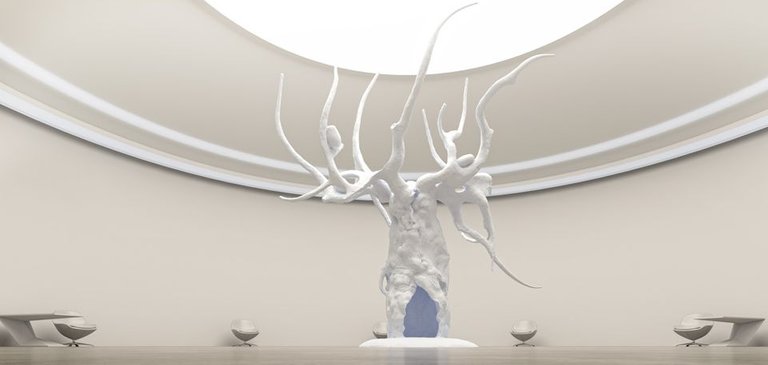Huge names bring Moscow biennial once again from the verge

Dashi Namdakov's Guardian of Baikal (2017)
A year prior, it resembled the seventh Moscow Bienniale of Contemporary Art was dead in the water, with no administration, keeper or setting. So it was a minor act of God when the primary exhibition,Clouds⇄Forests, opened at the New Tretyakov Gallery, the cutting edge workmanship branch of Russia's principle national craftsmanship historical center, on 19 September (until 18 January 2018). It is one of a few biennials running crosswise over Russia this pre-winter.
The Japanese guardian Yuko Hasegawa has conveyed a trio of huge names to the Moscow appear—Olafur Eliasson, Matthew Barney and Björk—as a component of the idea of "inventive tribes" that conquer the divisions of country states. The biennial has been welcomed with blended audits as an occasion with minimal worldwide effect. Be that as it may, the Moscow debut of Björk Digital, the Icelandic artist's immersive virtual-reality establishment, fits with the Tretyakov's plan of drawing in youthful Russians—on a current Saturday evening, the normal time of guests to the exhibition hall had all the earmarks of being under 20.
In spite of the fact that the biennial is likewise implied as a stage for Russian contemporary specialists, the passage is overwhelmed by a stupendous figure by Dashi Namdakov, a set up artist known for commissions by Russia's Kremlin and business tip top. "Watchman of Baikal" pays tribute to the Buryat craftsman's traveler and shaman legacy and his association with the world's biggest freshwater lake in Siberia. The 7.5-meter-high bronze was intended to be introduced on Lake Baikal's Olkhon Island amid the biennial, with a littler mortar duplicate at the New Tretyakov that guests could see with virtual-reality (VR) goggles as an innovative supplement. Natural concerns left the Baikal rendition, however biennial guests can at present wear a VR headset for a marginally confounding and rather stunning voyage to the lake.
Mikhail Piotrovsky, the executive of St Petersburg's State Hermitage Museum, was a visitor speaker on 30 September to examine the communication amongst established and contemporary craftsmanship. The Hermitage facilitated Manifesta, the wandering European contemporary workmanship biennial in 2014, and as of late displayed works by the Belgian craftsman Jan Fabre among Flemish Old Masters in the Winter Palace. In any case, Piotrovsky's most striking disclosure was that the Hermitage had not been intending to check the 100th commemoration of the Russian Revolution—despite the fact that the Winter Palace, previous home of the rulers—was a focal player.
"Our Dutch associates at the Hermitage Amsterdam asked us, 'What will we improve the situation October?' We stated, 'Not a lot'," Piotrovsky said. "They stated, 'Would you say you are insane? The entire world is holding up. Something should be done'." The Hermitage is, obviously, denoting the occasion, with two presentations: The Winter Palace and the Hermitage in 1917 (26 October-4 February 2018) and The Press and the Revolution: Publications 1917-1922 from the Hermitage Collections (26 October-14 January 2018).
Other Russian biennals now on
fourth Ural Industrial Biennial of Contemporary Art
Yekaterinburg has turned out to be one of Russia's focuses of contemporary workmanship, supported by its Constructivist legacy, which causes attract worldwide members to the biennial (until 12 November). The current year's fundamental task, which has as its guardian João Ribas, the appointee chief and senior keeper of the Serralves Museum of Contemporary Art in Porto, is titled New Literacy and inspects how the "fourth mechanical insurgency" of data and correspondence innovation is evolving society.
ninth Vladivostok International Biennale of Visual Arts (VIBVA)
The biennial of Russia's Pacific entryway has returned following a four-year rest, and given its area on Russia's eastern seaboard, of course with a view toward the East (until 20 October). Xiang Liping, a previous keeper and co-ordinator of the Shanghai Biennale, is custodian of the fundamental task, Port Morphology: Rules of the Game.
12thKrasnoyarsk Museum Biennale
Simon Mraz, Austria's social attache and the chief of the Austrian Cultural Forum Moscow, has put in two years creating plans to stamp the Revolution. His display, Mir: the Village and the World structures the centerpiece of the Krasnoyarsk Museum Biennale, Russia's longest-running contemporary craftsmanship biennal—this is the twelfth version—(until 28 February 2018). "Mir", for this situation, alludes to an arcane comprehension of the word, which more often than not implies peace, as a name for the Russian town group.
 @shahriarsamir
@shahriarsamir
Fantastic documentation, wow
Thats great . We are waiting